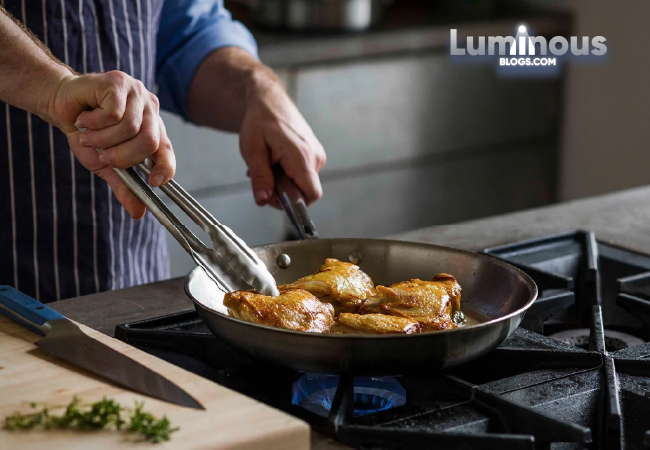
Culinary Adventures: Mastering Essential Cooking Techniques
Introduction
Cooking is a delightful journey that transcends cultures, flavors, and traditions. Whether you're an experienced home chef or a beginner in the culinary world, mastering essential cooking techniques can open the doors to a world of culinary adventures. In this blog, we'll explore the fundamentals of cooking, from knife skills to various cooking methods, and provide tips and insights to help you become a more confident and skilled cook. Whether you aspire to whip up gourmet dishes or simply want to improve your everyday cooking, the mastery of these techniques is a rewarding endeavor.
The Importance of Essential Cooking Techniques
Essential cooking techniques serve as the foundation of every culinary masterpiece. They empower you to take control of your kitchen and elevate your culinary creations. Here's why mastering these techniques is crucial:
Flavor Development: Proper cooking techniques unlock the depth and complexity of flavors in your ingredients, turning simple dishes into extraordinary culinary experiences.
Texture Mastery: Knowing how to cook ingredients to the desired level of doneness allows you to create dishes with the perfect balance of textures.
Versatility: With essential cooking techniques under your belt, you can confidently tackle a wide range of recipes, whether they're classic or avant-garde.
Time and Energy Efficiency: Mastering these techniques ensures that your cooking is efficient, saving you time and energy in the kitchen.
Creativity Unleashed: When you have a solid grasp of essential cooking techniques, you can let your creativity shine and experiment with new flavors, ingredients, and presentations.
Knife Skills
Knife skills are the cornerstone of every culinary endeavor. A mastery of knife techniques not only enhances your efficiency but also ensures safety in the kitchen. Here are the primary knife skills you should focus on:
Basic Knife Grip: Learn how to hold a knife correctly to maximize control and minimize the risk of accidents.
Chopping: Master the art of chopping to create uniformly sized ingredients for your recipes.
Dicing: Dicing allows you to create small, even cubes of vegetables, fruits, or meats.
Mincing: Mincing is essential for finely chopping herbs, garlic, and other aromatics.
Julienne: Julienne is a technique for cutting food into thin, matchstick-like strips.
Knife Honing and Sharpening: Regular honing and sharpening of your knives are vital to maintain their performance.
Heat Control and Cooking Methods
Understanding and controlling heat is at the heart of cooking. Different cooking methods allow you to manipulate heat to achieve various results. Here are some essential cooking methods:
Sautéing: Sautéing involves cooking food quickly in a small amount of oil over high heat. It's great for stir-fries and searing meats.
Roasting: Roasting is ideal for cooking larger cuts of meat or vegetables in the oven. It imparts a rich, caramelized flavor.
Baking: Baking is used for making bread, pastries, casseroles, and desserts. It requires precise temperature control.
Grilling: Grilling is perfect for outdoor cooking and imparts a smoky flavor. It's great for meats, vegetables, and even fruits.
Boiling and Simmering: Boiling is cooking food in rapidly boiling water, while simmering is a gentle boil. These methods are used for pasta, grains, and simmered dishes.
Braising: Braising involves searing food and then simmering it in a flavorful liquid, resulting in tender, flavorful dishes.
Sauce Making
Sauces are the finishing touch that can elevate a dish from ordinary to extraordinary. Here are some essential sauces and their foundations:
Hollandaise: A classic emulsified sauce made with egg yolks and butter, known for its velvety texture.
Bechamel: A white sauce made with a roux (flour and butter) and milk, which forms the base for many sauces.
Tomato Sauce: A versatile sauce made from tomatoes, often used as a base for pasta sauces, stews, and soups.
Velouté: Another foundational sauce made from roux and a light stock, often used in classic French cuisine.
Vinaigrette: A simple dressing made from oil, vinegar, and various seasonings, perfect for salads and marinades.
Precision Cooking and Baking
Precision cooking and baking are essential for crafting complex and delicate dishes. Here are some techniques to master:
Sous Vide: Sous vide involves cooking food in a water bath at a precise temperature to achieve perfect doneness.
Tempering: Tempering is a technique used in chocolate work to ensure a smooth, glossy finish.
Meringue Making: Meringue is used in desserts and requires precise techniques for achieving the desired texture and stability.
Roux Variations: Roux can be blond, brown, or dark, depending on the application. Mastery of roux variations is essential for many dishes.
Plating and Presentation
While not strictly a cooking technique, plating and presentation are vital for the overall dining experience. A well-presented dish can enhance the flavor and aesthetics of your creation. Consider the following tips:
Balance and Composition: Pay attention tobalance, color, and texture to create visually appealing plates.
Garnishing: Learn to garnish dishes with fresh herbs, edible flowers, and other elements that complement the flavors.
Proper Serving Temperatures: Ensure that hot dishes are served hot and cold dishes are served cold for the best taste and texture.
Practice and Exploration
To truly master essential cooking techniques, practice is key. Experiment with different ingredients, flavor profiles, and cuisines to expand your culinary repertoire. Don't be afraid to make mistakes; learning often comes from trial and error. The more you explore and practice, the more confident and skilled you'll become in the kitchen.
Conclusion
Mastering essential cooking techniques is a journey that offers endless culinary adventures. These skills are not only essential for crafting delicious and visually appealing dishes but also empower you to take control of your kitchen and explore the diverse world of flavors and cuisines. Whether you're cooking for yourself, your family, or entertaining guests, honing these techniques will elevate your culinary prowess and bring joy to your culinary adventures. So, don your apron, sharpen your knives, and let the culinary journey begin!


